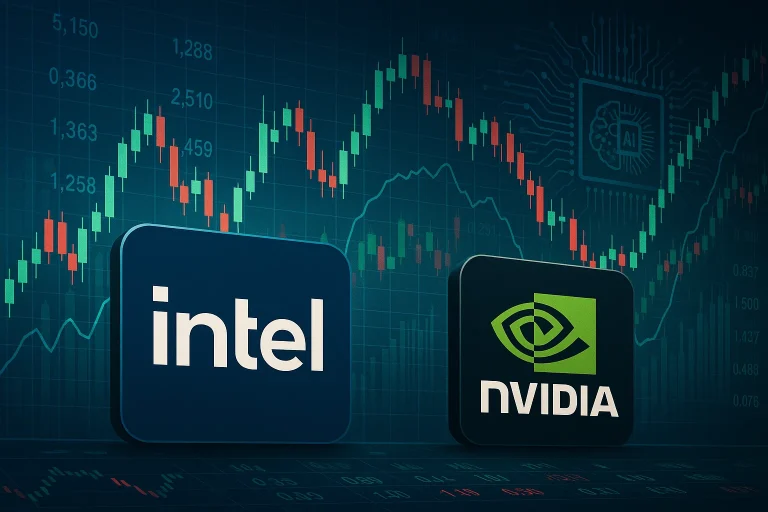Intel shares faced a downgrade from Citigroup despite the buzz around its recently announced partnership with Nvidia, which shook the markets with a $5 billion investment in Intel.
Citi’s analysts cut Intel’s rating from Neutral to Sell and raised the price target slightly to $29 but flagged several concerns about the stock’s valuation and future prospects.
The key worry is that Intel’s foundry business, a critical part of its turnaround strategy, faces stiff competition from industry leader TSMC, and Citi doubts Intel can catch up any time soon.
Moreover, while the Nvidia collaboration signals a solid strategic move, where Intel will integrate Nvidia’s graphics tech into its CPUs and develop chips for Nvidia’s AI platforms, Citi sees the total market opportunity as relatively small, estimating $1-$2 billion, unlikely to move the needle significantly for Intel’s gargantuan business.
Intel stock: Reasons behind Citi’s downgrade
Citi’s caution stems from skepticism about Intel’s ability to translate Nvidia’s investment into long-term growth.
Despite a spectacular 23% jump in Intel’s stock on the partnership announcement, its biggest single-day gain since 1987, Citi argues this rally largely prices in an optimistic outlook for Intel’s advanced foundry operations, which it views as a high-risk bet.
Analyst Danely highlighted that AMD already leads the CPU performance race with better multi-core chips at competitive prices and doubts that adding Nvidia’s graphics technology will change that dynamic.
Furthermore, the Nvidia deal’s focus on AI and data center chips represents a small slice of Intel’s overall revenue pie, meaning its impact on the broader business remains limited.
Additionally, hopes for Intel’s foundry business benefiting from this deal appear misplaced, as Citi sees Intel’s manufacturing technology trailing rivals by several years.
What lies ahead for Intel?
Looking forward, analysts remain divided on Intel’s prospects. While Citi stays bearish due to valuation concerns and foundry execution risks, other Wall Street players adopt a more measured stance.
According to LSEG data, of 47 firms covering Intel, the majority rate it as Hold, with only a few Buys and Sells sprinkled in, signifying cautious optimism balanced by wariness.
Some see Intel’s diversified portfolio and ongoing investments in AI as fertile ground for growth, especially as demand in data centers and personal computing evolves.
But many agree that execution will be key; Intel must close the technology gap with TSMC and AMD to justify lofty expectations.
Moderate price targets cluster around $21-$29, reflecting uncertainty and varied momentum.
The recent Nvidia deal could serve as a catalyst, but for now, Intel needs consistent operational progress and market wins to sustain confidence.
Investors should watch closely for Intel’s upcoming earnings reports, strategic updates, and any sign of turnaround traction in the foundry segment.
The post Why Citi downgraded Intel stock despite Nvidia’s $5 billion push? appeared first on Invezz

